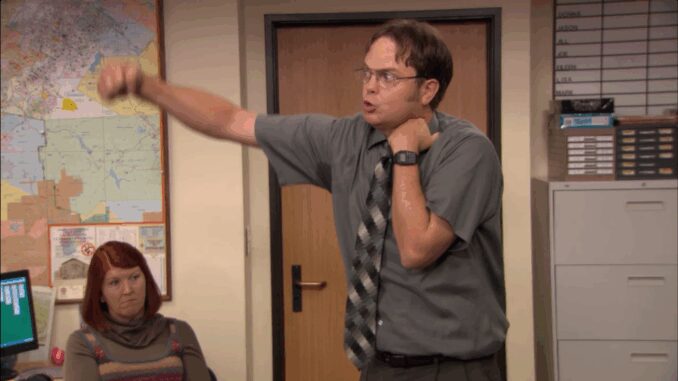
The human condition is a tightrope walk, a perpetual balancing act between the desire for self-preservation and the unfortunate knack for self-sabotage. We build walls to protect our fragile egos, meticulously craft personas to navigate social minefields, and often, in our fervent efforts to defend ourselves, we inadvertently construct the very mechanisms of our undoing. Few fictional characters illustrate this paradoxical tightrope quite as perfectly, and as hilariously, as Dwight K. Schrute, the beet farmer, Assistant to the Regional Manager, and ultimate embodiment of what happens when "self-defense" goes "full Schrute."
Dwight, at his core, is a creature of intense, if misguided, self-preservation. Every aspect of his being, from his meticulously organized desk to his arcane knowledge of martial arts, bears the imprint of a man perpetually preparing for the apocalypse, or at least, the next corporate downsizing. His "full Schrute" mode is triggered by perceived threats – a challenge to his authority, a slight against his integrity, or the merest hint of chaos in his meticulously ordered world. When Dwight goes "full Schrute," his every action is ostensibly a defensive maneuver. He seeks to impose order where there is none, to assert dominance where he feels undermined, and to arm himself with knowledge and preparedness against an unpredictable universe. His survivalist mentality, his rigid adherence to rules (often his own), and his almost pathological need for control all stem from a deeply ingrained, primal urge to protect himself from perceived vulnerabilities. He’s the office’s self-appointed safety expert, its resident martial arts master, and its unwavering bulwark against idiocy – all in the name of keeping himself, and by extension, his domain, safe.
Yet, this very instinct for self-defense is precisely what often propels Dwight into acts of profound self-destruction. Consider the infamous "fire drill" episode. Convinced that his Dunder Mifflin colleagues were unprepared for disaster, Dwight orchestrates an alarmingly realistic, and terrifying, simulated emergency. His intent is pure: to instill preparedness, to save lives. This is self-defense on a collective scale. But the execution is a masterclass in self-destruction: he locks doors, creates smoke, induces panic attacks, and physically endangers his coworkers, culminating in Stanley having a heart attack. In his zeal to defend, he nearly destroys. The very measures he takes to protect lead directly to chaos, damage, and disciplinary action – the antithesis of his desired outcome.
This pattern repeats itself with a comedic regularity that makes Dwight both endearing and infuriating. His attempts to ascend the corporate ladder often involve alienating his colleagues, undermining his superiors, and making absurd demands, all of which boomerang back to hinder his progress. His rigid, literal interpretation of rules and social cues, while perhaps shielding him from emotional manipulation, also isolates him, making him an object of ridicule or, at best, a source of exasperated amusement. His unwavering loyalty, when channeled without discretion, can lead him to become a pawn in Michael’s schemes, sacrificing his own dignity for a perceived allegiance. He builds an elaborate fortress of self-importance, only to find himself trapped within its walls, alone.
The illustrative power of "Dwight Goes Full Schrute" lies in its profound exploration of the delicate, often imperceptible line between guarding oneself and harming oneself. It’s a mirror held up to our own frantic attempts at self-preservation. How many times have we, in the name of self-defense, escalated a minor disagreement into a full-blown conflict? How often has our desire for control led us to micromanage ourselves or others into resentment? When do our carefully constructed boundaries become impenetrable walls that keep love, growth, and genuine connection out?
Dwight K. Schrute is not just a character; he is a cautionary tale, a living, breathing paradox. He reminds us that the fiercest battles we fight are often with ourselves, and that our most potent weapons, when wielded without self-awareness or a touch of grace, can become instruments of our own undoing. To go "full Schrute" might seem like an act of ultimate self-defense, an uncompromising assertion of one's will. But more often than not, it is the moment when the pursuit of self-preservation veers wildly off course, transforming into an unwitting act of self-destruction, leaving behind a trail of smoke, confusion, and the lingering scent of roasted beets.